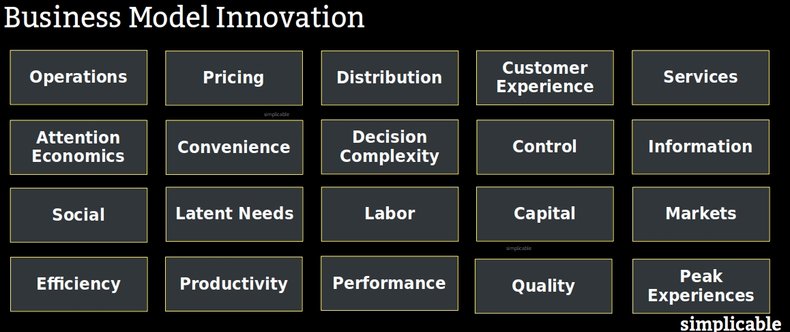

Operations
Changing the structure of operations. For example, a shift to distributed electricity production with solar panels as opposed to centralized power stations.Pricing
Challenging existing pricing models. For example, a flat rate price for unlimited streaming media as opposed to purchasing songs and movies as digital products.Distribution
New ways of reaching the customer. For example, the combination of product showrooms and ecommerce as opposed to traditional retail.Customer Experience
Shifts in customer experience such as a virtual product showroom that allows customers to view digital twins of products in their home.Services
Wrapping things in value added services. For example, products that are sold as a monthly service with full support.Attention Economics
New ways of engaging a target market. For example, advertising in a game environment.Convenience
Ways of saving the customer time and effort such as ecommerce that reduces the effort of shopping.Decision Complexity
Reducing the complexity of decision making processes for customers. For example, a review site for home improvement contractors that makes it easy to find a professional with a good reputation.Control
Allowing customers to customize and control things in a way that was never possible before. For example, the ability to develop a unique pair of shoes without much knowledge of fashion design.Information
New ways to discover information such as the invention of the internet search engine.Social
Changing the way that people socialize. For example, a digital community for a hobby that creates a sense of connectedness across a subculture.Latent Needs
Discovering new value for customers such as a completely new type of product. For example, the companies involved in inventing snowboarding as a new sport.Labor
New ways of creating value such as a system of free agents as opposed to employees.Capital
New types of capital or ways of sharing it. For example, the invention of the theme park.Markets
Creating new markets for the exchange of value. For example, an app that allows people to easily rent out property they aren't using.Efficiency
Products and services that create more output for an unit of input. For example, a new mode of transport that dramatically reduces energy costs.Productivity
Tools for people that allow them to create more with an hour of work. For example, photo editing software's impact on the photography business.Performance
Leaps forward in the performance of products and services. For example, the introduction of high speed trains that allow trains to compete with airlines for short domestic routes.Quality
Valuable and difficult to replicate improvements in quality such as the cultivation of a new type of artisanal food. For example, the invention of ice wine.Peak Experiences
Going beyond regular customer experience to experiences that people view as important to their identity or life. For example, space travel represents a potentially large future industry.| Overview: Business Model Innovation | ||
Type | ||
Definition | The discovery of new ways of capturing value. | |
Related Concepts | ||



























